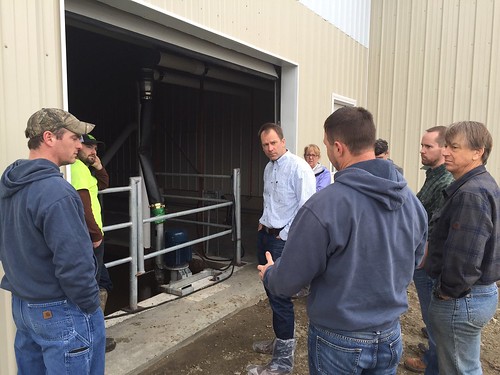
Eating a pint of Ben & Jerry’s ice cream may make you feel guilty about your waistline, but thanks to a new partnership between the ice cream company and USDA’s Natural Resources Conservation Service (NRCS), you may be able to feel less guilty about contributing to climate change. The partnership is designed to help Ben & Jerry’s milk suppliers—generally small dairies—understand their greenhouse gas footprint and consider voluntary conservation approaches to reduce that footprint.
NRCS and Ben & Jerry’s will help dairies implement conservation practices that meet Ben & Jerry’s objective of “Happy Cows, Happy Planet, & Happy Farmers.” Through its Caring Dairy sustainability program, Ben & Jerry’s will use USDA’s suite of greenhouse gas estimation tools, COMET-FarmTM and COMET-PlannerTM, to quantify on-farm GHG emissions and reductions. The COMET tools—COMET stands for CarbOn Management & Emissions Tool – are a product of a long-standing partnership between NRCS and Colorado State University.
Ben & Jerry’s and its dairy partners will use the information generated by COMET to identify on-farm conservation actions—such as approaches to manure management and soil health management practices—that can help reduce greenhouse gas emissions and sequester carbon. Ben & Jerry’s has financial assistance available to its dairy producers who can also apply for NRCS assistance to adopt or implement conservation activities.
“Ben & Jerry’s should be applauded for its corporate commitment to increasing the sustainability of its supply chain,” said NRCS Vermont State Conservationist Vicky Drew. “They approached us and we were happy to leverage our scientific tools and expertise to help increase the adoption of climate smart conservation practices.”
NRCS is increasingly engaged in supply chain partnerships as corporations look to increase the sustainability of their operations. In some cases, food companies are participating in NRCS programs. For example, Miller Coors and General Mills are partners in Regional Conservation Partnership Program projects. In other cases, as with Ben & Jerry’s, Blue Apron and Campbell’s Soup Company, NRCS is providing technical expertise and tools such as COMET and the new Resource Stewardship Evaluation Tool.
“These corporate partnerships are relatively new for NRCS, but they hold a lot of promise,” said NRCS Chief Jason Weller. “Food companies and agribusiness touch a lot of farmers and ranchers, and we hope these partnerships can help us reach new customers and also bring additional resources to bear for working lands conservation.”



